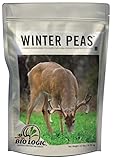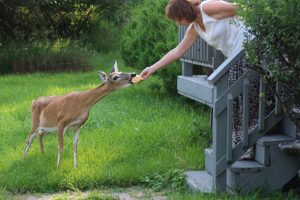
With hunting season upon us, you may be wondering, can deer eat bread?
Deer are pretty resilient when it comes to there diet, but bread should be used with caution.
Here’s why…
Deer will keep eating food like bread until it is gone. And bread is not exactly nutrient dense.
You may enjoy drawing deer into your yard so that you can observe them and enjoy their presence, but you are likely doing more harm than good by doing so.
Do Deer Eat Bread?
First things first, will deer eat bread?
Of course they will! They love it, especially white bread!
Pictures and videos can be found all over the internet of deer eating bread.
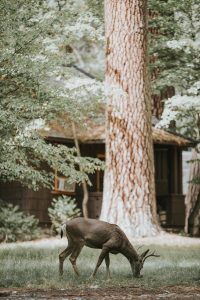
If you have ever had a deer in your backyard, you might have even fed deer bread yourself.
Wild animals like deer, squirrels, raccoons, and turkey all love bread.
But before you rush out and by a loaf of fresh Wonder Bread, you might want to reconsider…
Is Bread Bad for Deer?
Let’s face it…
Deer love bread.
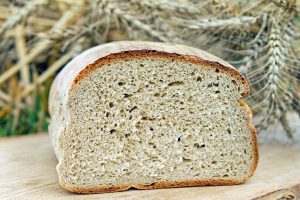
But while a slice or two of bread won’t hurt a wild deer, more than that can start to become problematic.
In order to be properly nourished, deer need the right blend of nutrients in their diet. A diet consisting of approximately 16% protein is ideal for deer.
Last time I checked, there isn’t a whole lot of protein in that stale loaf of bread.
In fact, there isn’t much nutritional value in bread at all.
Start feeding a person an excess amount of bread in addition to their normal diet and watch what happens… They will get fat and their health will decline!
Excessive amounts of bread will do the same thing to deer and may even result in excess amounts of lactic acid build up in their bloodstream.
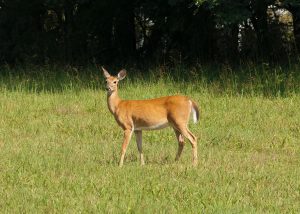
Deer Eat, and Eat, and Eat…
The other main issue with deer eating bread is that like with most foods sources, once they start, they don’t like to stop.
Many people like to leave bread out to attract deer, but this can do more harm than good.
If it is left up to the deer, they will eat every last crumble of bread they can.
While it might not sound like a big deal if deer are eating too much, it can disrupt their digestive systems and in rare cases actually cause death.
Risks of Feeding Deer Bread
Feeding bread to deer may seem harmless, but it poses several risks.
Bread lacks the essential nutrients that deer need for proper growth, leading to malnutrition and possible health problems.
If they eat too much bread, digestive problems are the likely results.
Also, deer become reliant on food provided by humans and will eat less of their natural food.
Bread also has the potential to attract other unwanted animals, and opens the door to the spread of diseases.
Chronic Wasting Disease (CWD)
A major concern with feeding deer bread is that it invites a common feeding location for more than one deer. With the rampant spread of chronic wasting disease, you are only encouraging the problem to become worse.
Chronic wasting disease (CWD) has become a major problem for deer populations all over the United States.
CWD is a prion disease. Prion diseases are transmissble spongiform encephalopathies (TSEs). They are a neurodegenerative disease, which means they degrade the nerological system.
In deer this typically exhibits itself as “wasting”. The deer rapidly loses weight and muscle mass, appearing as if they are wasting away (they are).
CWD numbers are on the rise so it is important to do whatever we can to help stop it from spreading.
Unfortunately there is no cure for CWD. Once a deer or deer population has become infected, they will suffer
CWD is highly contagious. And the main source of transmission is when deer share a food source.
Can Humans Get Chronic Wasting Disease?
So far, there haven’t been any reported cases of a human contracting CWD.
Some experts believe that it may be possible so it is recommended to never eat any meat you believe might be contaminated.
To date, there is no scientific evidence to suggest that humans can get CWD from infected meat but it is still not worth the risk in our opinion.
Lactic Acidosis
Lactic acidosis in deer is a metabolic disorder caused by the accumulation of lactic acid in the bloodstream.
This condition can occur when deer consume excessive amounts of easily digestible carbohydrates like bread.
The overload of carbs disrupts the normal digestive process in the deer and leads to an increase in lactic acid production.
Lactic acidosis can result in severe digestive problems, dehydration, and even death if it is bad enough.
This highlights why it is so important for deer to eat a natural and balanced diet.
Doing so prevents these conditions and helps maintain a healthy deer population.
What to Feed Deer Instead of Bread
Wild deer are much better suited to eating feed that mimics their natural diet.
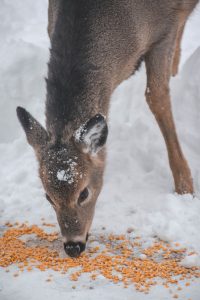 Corn is a common feed used to attract deer. But as we outlined in another article, there are much better things to feed deer besides corn.
Corn is a common feed used to attract deer. But as we outlined in another article, there are much better things to feed deer besides corn.
We recommend giving that article a read if you are considering supplemental feeding for deer. You best bet is to provide deer with a properly grown food plot so the deer can feed in a more natural way on a diet they are better adapted to.
- BIOLOGIC NEW ZEALAND MAXIMUM: 2.25 lb. bag of New Zealand Brassicas (Plants 1/4 Acre). Blend matures at different rates to ensure highly palatable forage for the entire life of the plot
- NUTRITIONAL VALUE: Averages 36% Crude Protein and over 80% TDN which promotes antler growth and overall herd health. Will grow in all soil types pending adequate soil moisture is available
- PRIMARY USAGE: Palatability increases as plants mature. Best late season through winter. However, may be consumed as fast as it grows. Produces anywhere from 10-15 tons of forage production per acre
- Extremely Attractive and Nutritious
- Extremely attractive cool tolerant peas that establish quickly and provide lush attractive forage
- Excellent plot for bow season and early firearm season
What Do Deer Eat in the Wild?
In the wild, deer’s natural diet largely depends on their habitat and what food sources are available.
They are herbivores so deer can eat grasses, shoots, leaves, and other vegetation.
Some of deer’s favorites are clover, dandelion, acorns, apples, twigs, and shrubs.
The availability of these will change with the seasons so deer adapt and change their diet throughout the year.
This ability to adapt is what allows deer to live in so many diverse ecosystems around the world.
Readily available water is also critical to deer and is an important part of a flourishing local deer population.
If You Must Feed Deer Bread
If you absolutely have to feed wild deer bread, follow these guidelines:
- Feed a deer no more than one piece of bread each
- Don’t leave a bunch of bread out for a group of wild deer to share
- Don’t feed them bread more often than once a month
FAQs
Can fawns eat bread?
For the reasons discussed above, feeding bread to fawns is not a good idea.
It comes with the same risks of diseases, lactic acidosis, as well as developing an early habit of relying on humans for food.
Is white or whole grain bread better for deer?
As we have highlighted, neither one is ideal for wild animals like deer. It lacks important nutrients and too much bread can be harmful to deer.
If you had to choose between the two, whole grain would likely be the better choice because it is slower digesting.
What time of day do deer eat?
Wild deer are most active at dawn and dusk. They typically feed during the early morning and early evening.
This helps them avoid potential predators.
Are deer attracted to salt licks?
Yes, deer love salt licks. It is an essential mineral for deer and they will naturally seek it out.
This is why mineral blocks are often used by hunters and wildlife enthusiasts in strategic locations to attract deer.
Are deer attracted to vanilla?
Vanilla extract is a deer attractant and has been used by hunters for a long time as a natural alternative to commercial attractants.
Conclusion
In summary, can deer eat bread?
Yes.
Should deer eat bread?
Probably not.
Hopefully now you will think twice before feeding deer bread. There are much healthier ways to feed deer that encourage the population and their health to flourish.
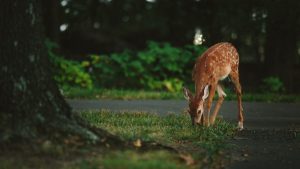
The risks of overfeeding and chronic wasting disease are serious. We do not want our deer populations harmed due to malnutrition or disease.
If you insist on feeding deer, checkout the article linked above for more healthy supplemental feeding suggestions.

